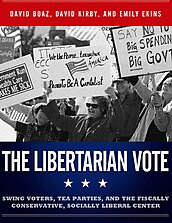The dominating theme of political commentary over the past decade has been that we are a nation divided — polarized, red vs. blue, liberal vs. conservative. But millions of American voters don’t fit neatly into liberal and conservative boxes. Squarely in the center of the electorate is a substantial number of voters with the power to decide elections. Who are these voters? What are their beliefs, affiliations and loyalties? The Libertarian Vote: Swing Voters, Tea Parties, and the Fiscally Conservative, Socially Liberal Center reveals that 10 to 20 percent of Americans are fiscally conservative and socially liberal-libertarian. And over the past decade, unlike loyal Democrats and Republicans, they have been swing voters. They have contributed, for example, to the success of both the tea party and the gay marriage movement. The Libertarian Vote provides some of the most pertinent and authoritative insights available on this substantial block of voters. Candidates and political strategists willing to look more carefully at them may very well discover a large group of voters energetically looking for a home.
Purchase for KindleThe Libertarian Vote: Swing Voters, Tea Parties, and the Fiscally Conservative, Socially Liberal Center
About the Authors
David Boaz, who passed away in 2024, was a distinguished senior fellow of the Cato Institute. Over more than four decades as vice president for public policy and executive vice president, he played a key role in the development of the Cato Institute and the libertarian movement. He was the author of The Libertarian Mind: A Manifesto for Freedom and the editor of The Libertarian Reader.
David Kirby is an adjunct scholar at the Cato Institute. His research interests include libertarian voters, public opinion, and field experiments in political campaigns. Kirby’s publications include “The Libertarian Vote,” “The Libertarian Vote in the Age of Obama,” and “The Libertarian Roots of the Tea Party.”
Emily Ekins is a vice president and director of polling at the Cato Institute. Her research focuses on public opinion, American politics, political psychology, and social movements. She leads the Cato Institute project on public opinion in which she designs and conducts national public opinion surveys and experiments.
